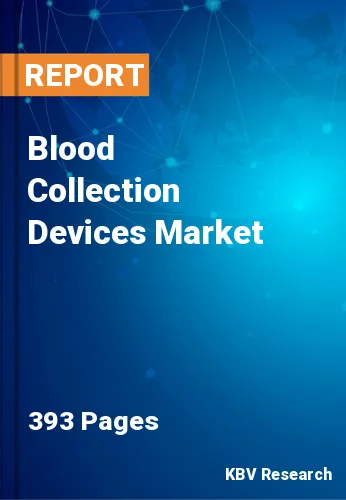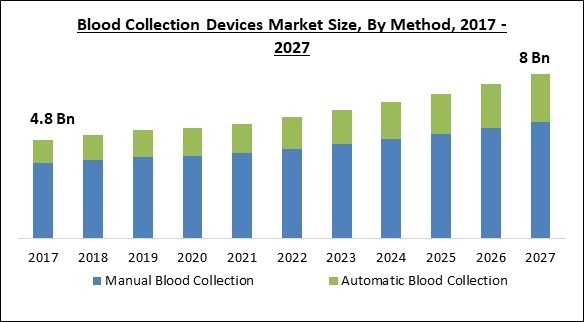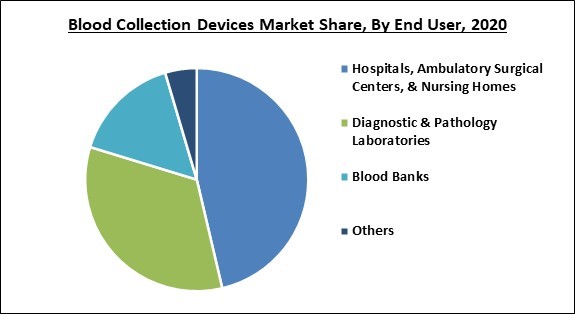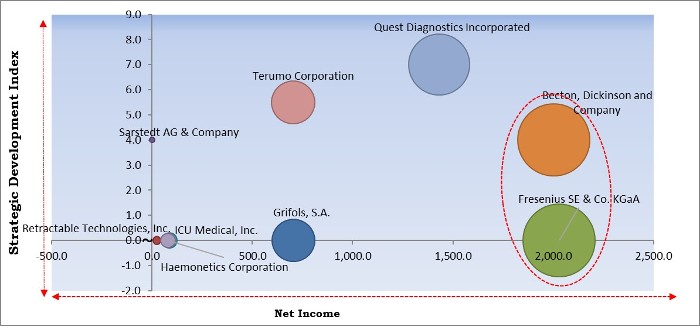
The Global Blood Collection Devices Market size is expected to reach $8 billion by 2027, rising at a market growth of 6.2% CAGR during the forecast period.
Blood processing and collection are two significant steps to be performed in preanalytical laboratory testing. Legitimate blood collection and on-time processing by skilled staff utilizing efficient devices are required in order to assure test reliability. Blood collection devices have been considered inert specimen carriers. That is why laboratories are investing a bit of effort to access innovative blood collection devices with the help of which they are not required to monitor the device performance continuously.
Additionally, blood is collected with the help of blood donation processes such as WB (whole blood), and after that, various components can easily be separated from it by the process of apheresis. The quantity of blood drawn depends upon the person and ought not to be more than 1% of the donor’s weight. The collection can be done manually or automatically by the use of automated equipment that can even collect particular components of blood.
Various advanced devices are being introduced in the market such as hematology analyzers. There are computerized and highly specialized machines which count the number of blood platelets, red & white blood cells, hematocrit level & hemoglobin present in the blood sample. With the help of a needle, phlebotomist would rupture a vein and collect the blood into a glass tube which contains ETDA as additives to prevent blood coagulation.
In the past few years, some diseases such as coronavirus have put human health into a threat all over the world. Diagnostics is the foremost step to be taken for the treatment of infectious diseases. It is an important step to identify efficient diagnostic strategies urgently to provide better treatment. Furthermore, effective diagnostic techniques are also important for the identification & better treatment of diseases.

The outbreak of the COVID-19 pandemic is an unexpected public health challenge for the whole world. The pandemic is anticipated to have a substantial impact on the blood circulation device market. Independent laboratories as well as hospitals were confused in deciding either to recommend to consult with laboratory hematologists for tests that involve higher risk or not offer tests that couldn't be performed securely. This has impacted the market adversely in the initial months of the pandemic resulting in a decline in the use of blood collection devices.
Whereas, rising alert and the increasing testing volumes, coupled with the requirement for regular body & health checkups will result in the growth of blood collection devices. Results presently take around four to six days for the normal population, significantly longer than two to three days required before. This is due to the prioritization of tests for symptomatic healthcare workers & hospital patients that on average take one day which is resulting in the delayed cycle.
Collection of blood samples of patients from difficult venous access (DVA) is not easy and even is impossible sometimes. The traditional products used for blood collection products are sometimes unable to collect blood samples efficiently. This may lead to repeated attempts for collecting blood. Also, this increases the risk of anemia & the transfer of blood-borne pathogens to phlebotomists. In order to get over this issue, innovative hematology tube designs have been launched that support capillary blood collection along with reducing the risk of processing & collection errors in patients with DVA.
If there is an issue with the blood, it may affect the total health of the body. Some types of blood disorders are platelet disorders, bleeding problems & excessive clotting that may affect the blood clots; anemia that happens when blood do not let the oxygen go through the rest of your body, blood cancers like myeloma & leukemia and eosinophilic disorders that is an issue with the particular type of white blood cells. As per the information provided by World Health Organization, hemoglobin disorders were mainly found in 60% of 229 countries and were affecting 75% of births. This encourages policymakers to find the most efficient treatment strategies. Hemophilia A affects 1 in every 5000 male births in the United States. Every year approximately 400 babies are born with hemophilia.
The cost involved in initial investment for the adoption of automated blood collection by the use of apheresis devices involves high costs as compared to blood collection. Also, the cost of therapeutic apheresis is high as it further involves the cost of disposables. The higher cost of these devices is leading to the lower adoption of automated blood collection devices. As many of the smaller blood banks, hospitals cannot afford to use these blood collection devices. In addition, the cost of apheresis therapy is a matter of concern for the whole world. The cost for individual apheresis treatments may widely differ.

Based on End User, the market is segmented into Hospitals, Ambulatory Surgical Centers, & Nursing Homes; Diagnostic & Pathology Laboratories, Blood Banks and Others. In 2020, the diagnostic & pathology laboratories segment witnessed a significant revenue share in the blood collection devices market. The major factor responsible for the growth of this segment is the availability of such laboratories at various locations. Additionally, the increasing number of tests due to the rising number of diseases and the growing presence of online websites are some other factors supporting market growth.
Based on Product, the market is segmented into Blood Collection Tubes, Needles & Syringes, Blood Bags, Blood Collection Systems/Monitors and Lancets. The needles & syringes segment acquired a significant revenue share in the blood collection market in 2020. This is because of the high affordability, high adoption, and repeat purchase of syringes & needles. This rising demand for needles & syringes would further contribute to the blood collection devices market. The blood bags segment witnessed a promising share in the blood collection market in 2020.
Blood bags are utilized for transfusion & storage of blood collected from patients for transfer or sample analysis. The growth of this segment can be attributed from the rising number of accidents & surgeries. As per the American Red Cross, 2018 statics, the U.S. requires around 36,000 units of RBCs per day.
Based on Tubes Type, the market is segmented into Plasma/whole-blood Tubes and Serum Tubes. In 2020, the plasma/ whole-based tubes segment accounted the highest revenue share in the blood collection devices market. Plasma contains fibrinogen and various other clotting factors when separated from the red blood cells. Evaluated tubes used to collect plasma contain anticoagulants. The added substance in each tube is mentioned on the label & tube stoppers are color coded by the present additives.
Based on Plasma/whole-blood Tubes Type, the market is segmented into EDTA Tubes, Heparin Tubes, Coagulation Tubes, Glucose Tubes and Others. The ETDA tubes segment procured the largest revenue in the blood collection device market in 2020. ETDA prevents clotting by chelating calcium which is an important component of coagulation. ETDA tubes are in high demand because the plasma stored from these tubes can treat blood can be utilized to measure most protein, genetic, and also genetic material can be stored easily from ETDA buffy coats.
Based on Tubes System Type, the market is segmented into Vacuum Tubes and Non-Vacuum Tubes. The non-vacuum tube segment procured a substantial revenue share in the blood collection device market in 2020. The rubber stoppers in the non-vacuum tube are present in different colours that help in identifying the different liquids inside the tube. The additive present in these tubes gets mixed with the blood while blood collection. Furthermore, non-vacuum tubes have an expiry date as the vacuum get vanished with the time due to which blood will not be collected when the cap is punctured by the needle.
Based on Method, the market is segmented into Manual Blood Collection and Automatic Blood Collection. In 2020, the manual blood collection segment dominated the blood collection device market by acquiring the highest revenue share. This is the most preferred method as it is considered the accurate one because the blood is collected by trained professionals. Also, these professionals have proper knowledge about the human body and thus can do the procedure without any risk or failure.
Based on Application, the market is segmented into Diagnostics and Therapeutics. The diagnostics segment led the blood collection device market by generating the largest revenue share in 2020. The demand for blood collection devices is increasing in this segment because of the rising spread of chronic diseases such as diabetes, cancer & cardiovascular diseases. Furthermore, increasing awareness regarding going through regular health checkups and the rising prevalence of infectious diseases are some other factors responsible for the blood collection market.
| Report Attribute | Details |
|---|---|
| Market size value in 2020 | USD 5.4 Billion |
| Market size forecast in 2027 | USD 8 Billion |
| Base Year | 2020 |
| Historical Period | 2017 to 2019 |
| Forecast Period | 2021 to 2027 |
| Revenue Growth Rate | CAGR of 6.2% from 2021 to 2027 |
| Number of Pages | 393 |
| Number of Tables | 724 |
| Report coverage | Market Trends, Revenue Estimation and Forecast, Segmentation Analysis, Regional and Country Breakdown, Competitive Landscape, Companies Strategic Developments, Company Profiling |
| Segments covered | Product, Method, Application, End User, Region |
| Country scope | US, Canada, Mexico, Germany, UK, France, Russia, Spain, Italy, China, Japan, India, South Korea, Singapore, Malaysia, Brazil, Argentina, UAE, Saudi Arabia, South Africa, Nigeria |
| Growth Drivers |
|
| Restraints |
|
Based on Regions, the market is segmented into North America, Europe, Asia Pacific, and Latin America, Middle East & Africa. The North America region witnessed maximum revenue share in the blood collection devices market in 2020. Increasing cases of blood disorders, availability of better healthcare facilities, and the presence of major vendors in the regional market are the main factor responsible for the growth of the blood collection devices market.
Free Valuable Insights: Global Blood Collection Devices Market size to reach USD 8 Billion by 2027

The major strategies followed by the market participants are Partnerships. Based on the Analysis presented in the Cardinal matrix; Becton, Dickinson and Company and Fresenius SE & Co. KGaA are the forerunners in the Blood Collection Devices Market. Companies such as Grifols, S.A., Retractable Technologies, Inc., Quest Diagnostics Incorporated are some of the key innovators in the Market.
The market research report covers the analysis of key stake holders of the market. Key companies profiled in the report include Sarstedt AG & Company, ICU Medical, Inc., Grifols, S.A., Retractable Technologies, Inc., Quest Diagnostics Incorporated, Becton, Dickinson and Company, Haemonetics Corporation, Terumo Corporation, Fresenius SE & Co. KGaA, and Cardinal Health, Inc.
By End User
By Product
By Tubes Type
By Plasma/whole-blood Tubes Type
By Tubes System Type
By Method
By Application
By Geography
The global blood collection devices market size is expected to reach $8 billion by 2027.
Rising prevalence of inherited blood disorders are driving the market in coming years, however, high cost of automated blood collection devices limited the growth of the market.
Sarstedt AG & Company, ICU Medical, Inc., Grifols, S.A., Retractable Technologies, Inc., Quest Diagnostics Incorporated, Becton, Dickinson and Company, Haemonetics Corporation, Terumo Corporation, Fresenius SE & Co. KGaA, and Cardinal Health, Inc.
The Blood Collection Tubes segment acquired maximum revenue share in the Global Blood Collection Devices Market by Product 2020; thereby, achieving a market value of $2.6 billion by 2027.
The Therapeutics segment has shown growth rate of 7.6% during (2021 - 2027).
The North America is the fastest growing region in the Global Blood Collection Devices Market by Region 2020, and would continue to be a dominant market till 2027; thereby, achieving a market value of $2.7 billion by 2027.
Our team of dedicated experts can provide you with attractive expansion opportunities for your business.
